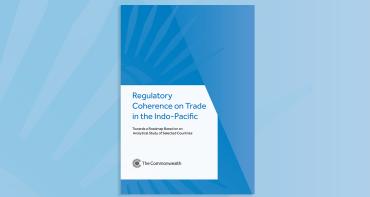Professor Stiglitz participated in a Commonwealth roundtable on Aid for Trade on 29 August. Following the discussion he spoke to the Commonwealth about trade, the current global economic situation and the multilateral trading system
Commonwealth: The Commonwealth Secretariat has been working on the issues of Aid for Trade and helping least developed countries and small and vulnerable economies in trade negotiations. What do you think about the Commonwealth’s work?
Stiglitz: The Commonwealth is a distinct place, it is one of the few places where you have large numbers of countries both developed and developing that come together in a non-conflictual context.
At the World Trade Organization you’re in a bargaining relationship. Here at the Secretariat, it’s trying to understand what works and what doesn’t work, to provide a better understanding that can hopefully influence the negotiation process to lead to better outcomes.
I’ve been to several of their meetings - they’re very interesting, very lively - it’s really a unique institution/organisation in the global landscape.
Commonwealth: With the current global economic situation what genuine prospects do you think there are for Least Developed Countries and other vulnerable countries’ trade performances over the next few years?
Stiglitz: I’m very pessimistic about the short run global macroeconomic prospects. I think there are obviously big questions about how Europe is going to manage the Euro crisis, how some of the countries that seem to be embarked on austerity will continue those - as evidence comes in that those policies are counterproductive will they revise those policies and adjust them to the reality of what is going on?
So there is a lot of uncertainties, there is at least a real risk of very weak global growth and as a result of that trade will grow more slowly.
The real worry is that in that context protectionism could grow.
Commonwealth: Do you think Aid for Trade is working?
Stiglitz: Some parts of Aid for Trade have been quite successful but more broadly it has been less successful than one had hoped.
There needs to be really more ‘additionality’, more [in the sense that] aid ought to be incremental.
But secondly one needs to think more precisely about the various impediments to trade and growth.
Why is it that as liberalisation has occurred in so many instances there has not been expansion of trade as people had hoped. What particular interventions would be most helpful?
Commonwealth: Should we concentrate on revitalising the Doha Round of trade agreements? If market access is not granted in the first instance is Aid for Trade going to be effective?
Stiglitz: My feeling is that the problems in the development round are quite deep seated and Aid for Trade is an idea that could go forward quite independently and should go forward quite independently.
I do think it’s almost more the other way, if aid for trade becomes more successful - more additionality, more effectiveness - it could have a positive effect on the development round. So it’s more that I think really the focus ought to be right now on Aid for Trade and then see what we can do on trade negotiations.
Commonwealth: The Aid for Trade debate has been dominated by discussions around assistance provided by developed countries to vulnerable countries. However, over time, some developing economies, particularly China, have come up as a source of trade related assistance? Do you think the impact of, for example, Chinese assistance is going to be different and if so how?
Stiglitz: On the positive side, it’s been very good in developing infrastructure.
It’s been very good at linking the developing countries with their market so, for instance in the case of Ethiopia, helping them grow the sesame seeds that it would then buy. It’s a very good case of supply side development that was related to trade.
There is a concern that in many ways they have acted like advanced industrial countries, that they have looked so far disproportionately, to say, Africa as a source of commodities, raw materials. But there’s increasing discussion and even movement as wages in China have increased, there are some Chinese firms that are beginning to shift some operations to Sub-Saharan Africa, so they’re beginning to explore the possibility of using Africa beyond commodities.
| During the Aid for Trade roundtable Professor Stiglitz called for an enshrining of a ‘Right to Trade’ in the global trading regime, among other proposals to help the trade performances of vulnerable economies. |
Commonwealth: How do you see the multilateral trading system evolving with almost all big countries now in the club – the latest one to join being Russia?
Stiglitz: Russia joining hasn’t made that much difference.
It would have been hard to have a multilateral trade regime without China, the second largest trading economy. Once China joined the broad picture was there but it has now become almost universal.
The concern now is more about non-tariff barriers and a host of regulatory issues, standards, that could either facilitate trade or act as a barrier to trade. I guess in a way we solved the easiest problem which are the tariffs. As we solved that problem we realised that actually there are a host of really hard problems and those are going to take a long time. Another one is exchange rate. The USA says that China is using exchange rate as unfair trade - very hard to think about how you address that issue in a global trading regime.



